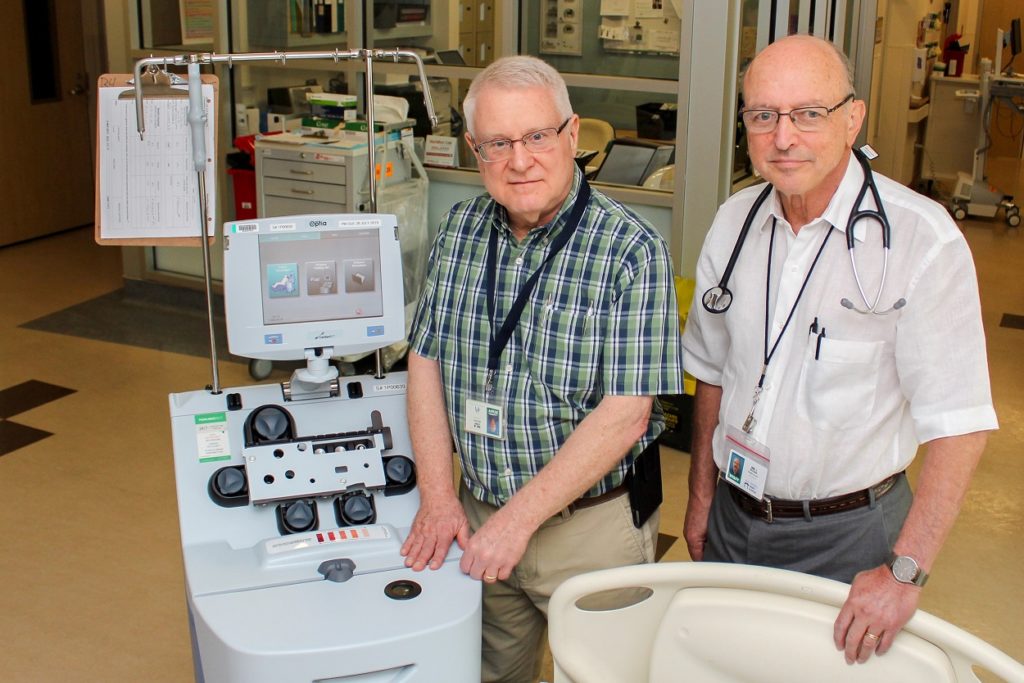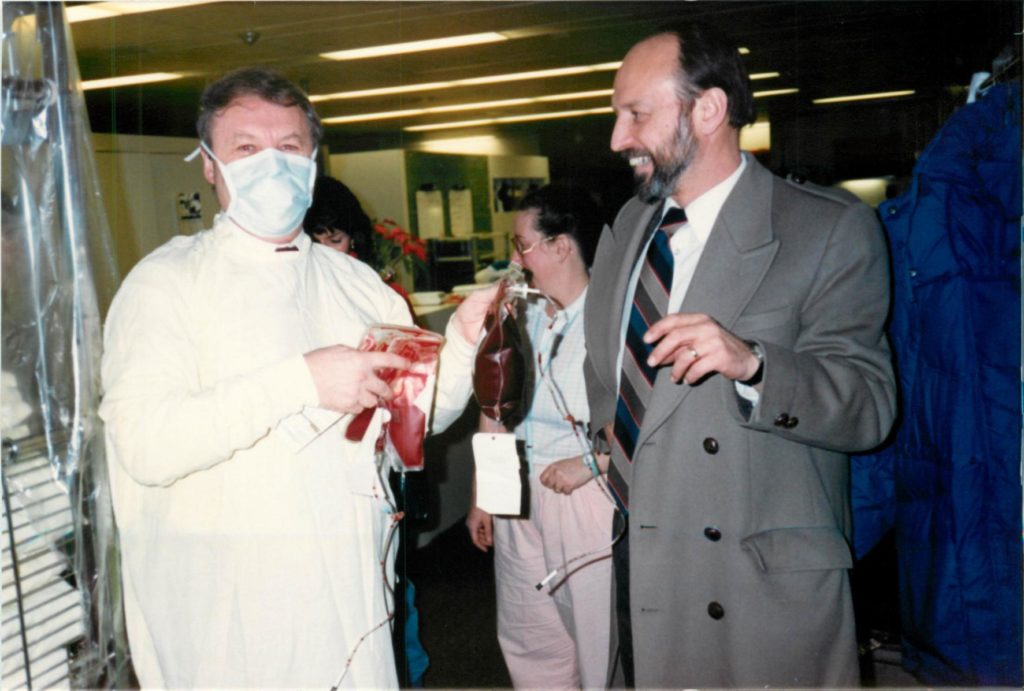
A legacy of lifesaving stem cell transplants
Hamilton Health Sciences (HHS) has a long and accomplished history in providing stem cell transplants to blood cancer patients. As part of HHS, Juravinski Hospital and Cancer Centre (JHCC) is one of only three hospitals in Ontario providing all forms of adult stem cell transplants.
One form of stem cell transplantation is referred to as allogeneic transplantation, and is a method of replacing cells in the bone marrow that cause cancer. Stem cells are infused into the patient so they can attack the underlying diseased cells to help fight the cancer. Allogeneic stem cell transplants involve the infusion of stem cells that are collected from a matching donor. This is different from autologous transplants, which involve using the patient’s own stem cells.
JHCC has established itself as a leader in all forms of stem cell transplantation, and the clinical teams are highly trained to manage the transplant process and to provide both before and after transplant care for patients.
An historic milestone
In July 2019, JHCC celebrated a major milestone when Dr. Brian Leber performed the thousandth allogeneic stem cell transplant.
“This number is quite impressive,” says Dr. Leber. “It’s a wonderful testament to how long the unit has been functioning and the many patients we have helped over the last three decades.”
A Canadian first
The teams at HHS have spearheaded several new advances that have become the standard of care in stem cell transplantation.
In the past, transplants required stem cells that were harvested from a relative of the patient, usually a sibling. Stem cells from an unrelated donor lacked genetic compatibility and could result in fatal rejection of the new cells by the patient’s immune system.
Dr. Irwin Walker, a leader in hematology at JHCC, is a pioneer in the field of unrelated allogeneic stem cell transplants.
In 1988, Dr. Walker performed the first successful Canadian transplant with an unrelated donor, who was infused with stem cells that were collected from a donor in the United States.

Dr. Irwin Walker (right) arrives from the United States with the stem cells.
The donor was identified through the recently created registry of international stem cell donors. Dr. Walker flew to Minnesota to pick up the stem cells and flew back to Hamilton to perform the procedure along with Dr. Michael Brain, who was head of the transplant program at the time.
“It was a milestone in transplantation because only a minority of patients who needed to receive a transplant actually had a matched donor, which at that point was restricted to siblings,” says Dr. Walker. “Now that we’re able to use unrelated donors, 80 per cent of patients who need a stem cell transplant could receive one.”
Recent innovations
JHCC has continued its leadership role in the area of stem cell transplantation. This includes haploidentical stem cell transplants involving the use of stem cells from “half-match” family members when a matched donor cannot be identified.
“We headed the only Canadian trial on half-match donors in the early 2000s,” says Dr. Walker. “Then approximately six years ago, we started performing half-match transplants more routinely. Because of this, almost all patients can have a suitable donor, either matched sibling, matched unrelated donor, or half-matched family member.”
Likewise, patients who were once considered too old to receive the procedure now have the option of undergoing a transplant.
“We pioneered the reduced intensive conditioning – or mini-transplant – in Canada probably 15 years ago,” says Dr. Leber. “Now it’s a standard in caring for older or frail patients.”
Clinical trials
The teams at JHCC are also conducting innovative clinical trials to test and develop new transplantation procedures.
In 2013, Dr. Walker successfully removed T cells from a patient’s sister who was not a match, then transplanted the graft of stem cells (minus the T cells) into the patient, whose cancer is now in remission.
“Our talented staff have long-term relationships with our patients, most of whom are alive today because of a stem cell transplant.”
“Another recent accomplishment is the work we’re doing in Chimeric Antigen Receptor (CAR) T-cell therapy,” explains Dr. Leber.
CAR T-cell therapy begins with the extraction of T cells, a type of immune cell, from the patient’s blood. The T cells are modified in a lab with a special receptor to help them fight cancer cells, then they are infused back into the patient.
“We’re one of the first centres in Canada to participate in the trial and we will be the referral centre for half the country,” says Dr. Leber. “We will continue to participate in clinical trials to improve this treatment.”
Ongoing financial support is vital
The need for stem cell transplants is greater than ever.
In the 2018-2019 fiscal year, JHCC performed 230 stem cell transplants, representing a nearly 70 per cent increase over the last five years.
In 2018, Juravinski Hospital and Cancer Centre Foundation achieved its $5-million fundraising goal for the Tomorrow Stems From You® campaign. Funds raised are enabling the expansion of a dedicated and specialized clinical space, and the purchase of essential equipment.
Although the fundraising goal was met, ongoing donor support is vital for the purchase of additional equipment and patient amenities.
“It’s a wonderful testament to how long the unit has been functioning and the many patients we have helped over the last three decades.”
As the Stem Cell Transplant Program continues to evolve with advances in medical science and technology, the team at JHCC are looking forward to achieving many future milestones with your support.
“Our talented staff have long-term relationships with our patients, most of whom are alive today because of a stem cell transplant,” says Dr. Walker. “Many of our patients attend our annual Christmas party and picnic even though they were treated 30 years ago. This really illustrates how our staff become deeply invested in our patients’ lives.”
Please visit hamiltonhealth.ca/stems to donate today.
